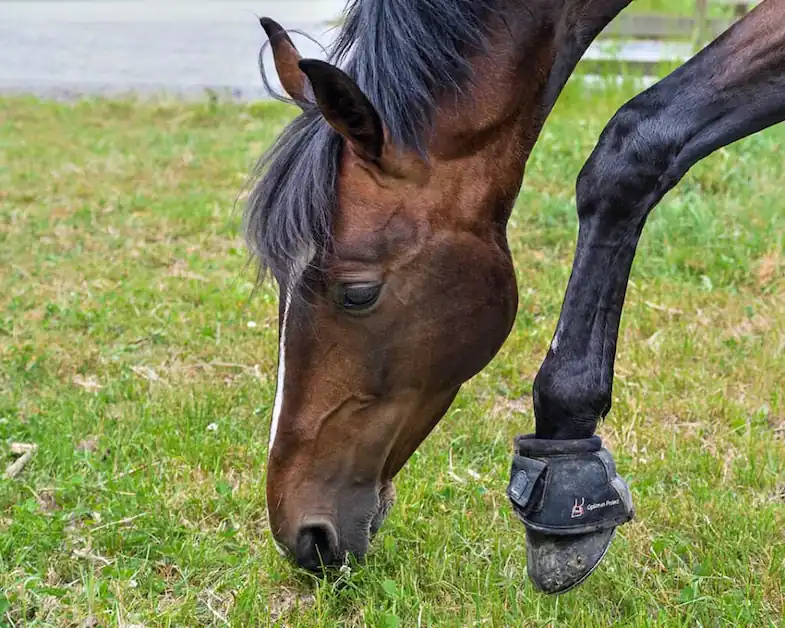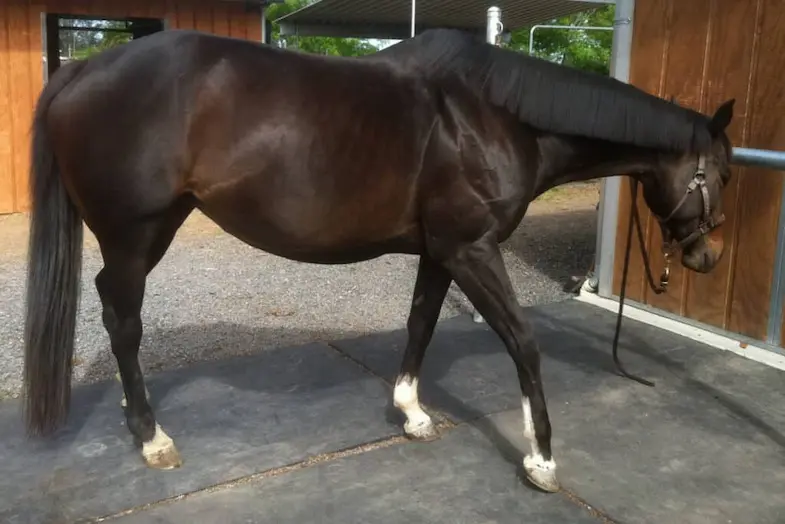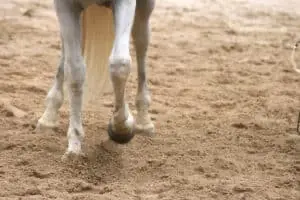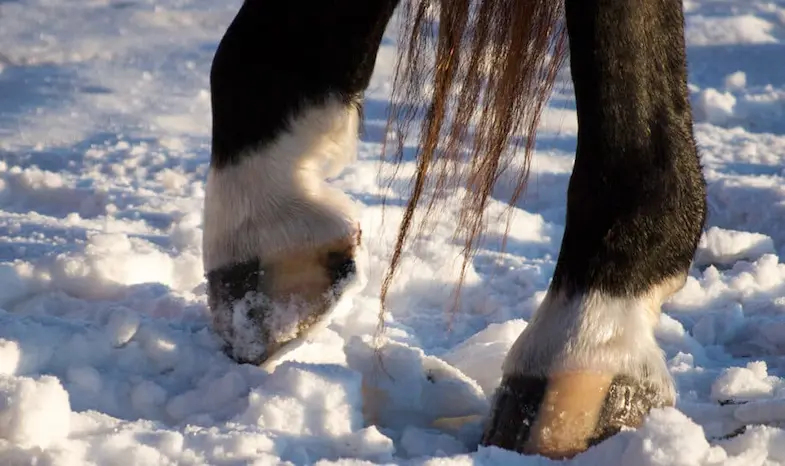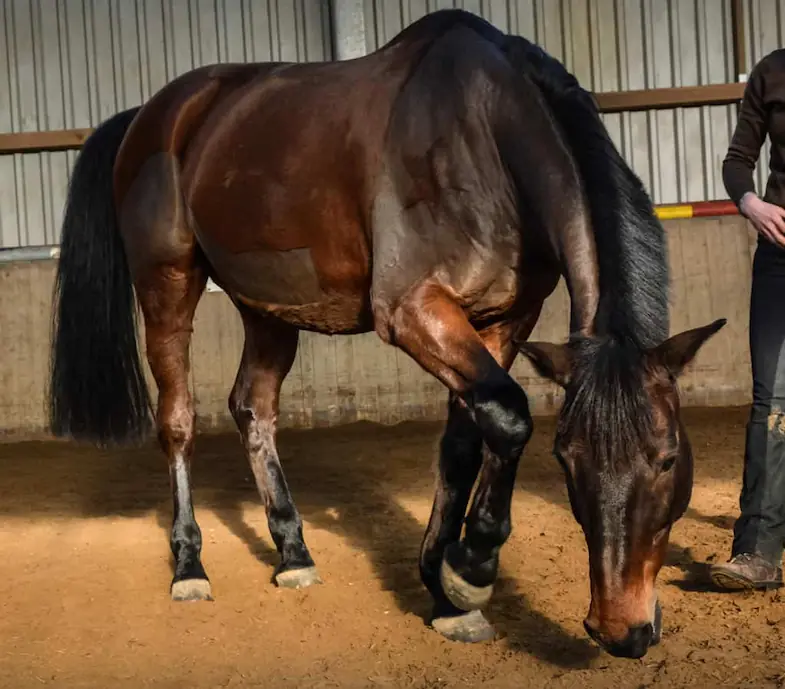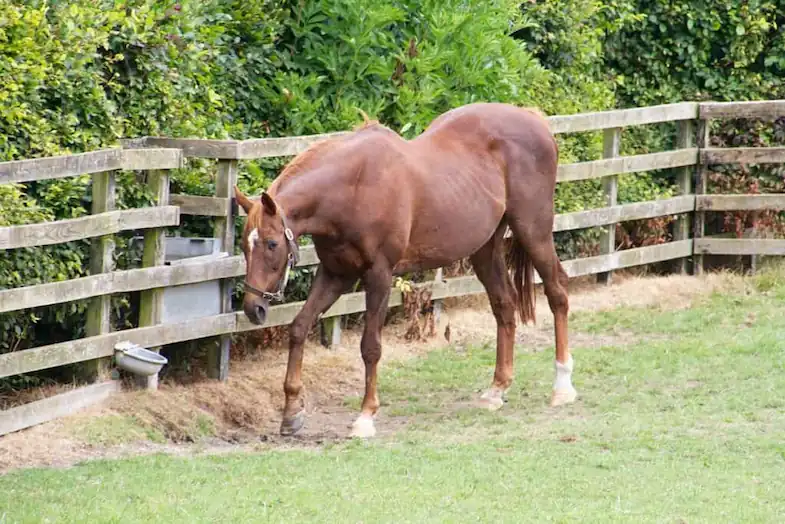I recently bought a new horse, a beautiful Appaloosa called Red, who would paw at the ground every time I went anywhere near the feed room. While it didn’t really bother me at first I was worried it would develop into a vice that would be difficult to stop. This prompted me to do some research into why horses paw the ground and how to stop them from doing it.
There are two main reasons why horses paw the ground, physical and behavioral. Physical pawing, often due to pain, is accompanied by other symptoms such as loss of appetite. Behavioral pawing, on the other hand, can happen because the horse wants attention, is bored or is anticipating food. Pawing can also be part of a horse’s natural behavior.
While many people think of pawing as nothing more than an annoying habit it’s often your horse’s way of telling you something is wrong or bothering them. Yes they can (and do) paw the ground when turned out but this is part of their natural behavior, if your horse starts pawing while he’s stabled or while being ridden there’s quite likely an underlying issue that should be addressed.
Why do horses paw the ground?
While pawing the ground can be part of a horse’s natural behavior it can also be your horse’s way of telling you that something is wrong so it shouldn’t necessarily be ignored.
Physical Reasons Horses Paw the Ground
Horses aren’t able to tell us when something is wrong so it’s important that you can read your horse and his body language in order to know when there’s a problem. If your horse paws the ground while also displaying other symptoms such as a change in mood, loss of weight, or abnormal sweating then there’s a physical reason for his behavior that needs to be addressed.
Even if you’re not seeing any obvious signs of pain or discomfort you should speak to your veterinarian for advice, they will not only be able to tell you exactly what’s wrong with your horse but will also help to treat your horse.
Horses Paw the Ground When They Feel Pain
Horses that are suffering from pain, especially if it’s abdominal pain caused by an ulcer or colic, often start to paw the ground in an attempt to reduce the pain, or at the very least take their mind off of it. I’ve written an extensive article about ulcers in horses, including how to diagnose and treat them. If your horse is pawing the ground, I recommend that you read my article about equine ulcers.
Pawing the Ground May Be a Sign of a Horse’s Discomfort
If your horse’s saddle is too tight or the rear cinch is rubbing against him, he may paw at the ground in an attempt to make himself more comfortable. If your horse is doing this you should check your tack to make sure it’s all fitted properly, if you don’t then it can lead to more serious behavioral problems as the discomfort turns to pain.
Pawing the Ground Could Mean Your Horse Has an Infection
You might not realize it but some infections can alter your horse’s behavior and, although it’s not common, it can lead to what would normally be classed as vices. The good news though is that generally, a course of antibiotics will resolve this.
Behavioral Reasons Horses Paw at the Ground
If there’s no physical reason for your horse pawing the ground (and it’s not part of his natural behavior) then there’s a behavioral reason behind the habit. While it’s not likely to be serious you should still try and resolve the problem. In the long run, it’ll make for a happier horse.
Horses Paw to Get Attention
Whether your horse is trying to get your attention or that of another horse, pawing the ground is a common way of doing this. While we may call out to a friend or whistle to get their attention but horses will paw the ground instead.
Horses Paw When They’re Bored
Horses are intelligent animals that need to be stimulated (or at least occupied) so when they’re on stall rest or stabled for prolonged periods of time without anything to do they can become very bored. This boredom can often lead to the horse kicking their stall door or pawing the ground, just as a way of alleviating the boredom and passing some of the time.
If your horse is stalled for prolonged periods of time this article that I wrote about reducing stall rest boredom will really help. You may also find this article on what horses do all day interesting and helpful.
Horses Sometimes Paw the Ground to Assert Dominance
This isn’t so common, although it does need to be addressed, but if your horse arches his neck and straightens his leg out while he’s pawing at the ground then he’s trying to assert his dominance. If he does this in front of you then he’s trying to tell you that he’s the boss, whereas if he’s doing it in the field then he’s saying he’s in charge of the herd (or at least wants to be).
Sometimes Horses Paw at the Ground to Relieve Excess Energy
Horses that are fed a lot of high-energy food but not exercised enough can begin to paw the ground as a way of letting off steam and getting rid of their excess energy. Typically this sort of pawing happens while the horse is still stabled but it can also continue while they’re outside too, although this is more likely to manifest itself in more serious vices such as rearing.
If Your Horses is Pawing the Ground it May Be a Sign of Frustration
If you don’t understand what somebody is asking you to do you may sigh out of frustration and horses are no different, except they paw the ground instead (although they may sigh as well). It’s not that your horse is being bad-tempered or doesn’t want to do what you’re asking it’s that he simply doesn’t understand. If you leave your horse tied up for a long time then he may also voice his frustration by pawing the ground, instead try not to leave him tied up for too long.
Pawing May be a Sign of a Horse’s Impatience
We’ve all been there, you’re preparing your horse’s food and he starts pawing at the ground. The reason he’s doing this is that he’s getting impatient and is anticipating his food. This is probably the most common behavioral reason why horses paw the ground, but it’s also the most common trait we’re happy to ignore. This sort of pawing can also be seen in horses that are keen to be turned out, brought in, or even just eager to do something.
If Your Horse is Pawing the Ground, It Could be Due To Irritation
Horses that are bothered by flies often swish their tail or stamp their feet but they can also paw the ground. This is in part to get rid of the flies but also because they’re irritating the horse and starting to annoy him.
Horses Sometimes Paw the Ground When They Feel Isolated
Just as horses that are stabled away from other horses for a long time can get bored, those that don’t have companions (of any kind) can also start to paw the ground out of loneliness, boredom, and stress. Horses are herd animals so need the company of others, ideally, this should be other horses, but if that’s not possible then other animals such as sheep, alpacas, and even chickens are better than no companion at all.
Nervous Horses Sometimes Paw at the Ground
While there can be a number of reasons why horses paw the ground, if they do it over and over again quickly there’s a very good chance that it’s because they’re nervous, anxious, or stressed about something.
Pawing at the Ground Could be a Natural Behavior for Your Horse
Unlike some other behaviors, pawing the ground can be seen in wild horses as well as those that are turned out.
Horses Paw at the Ground to Forage for Food
When the ground is frozen (or is under a layer of snow) it can be difficult for horses to get to the grass so they often paw at the ground gently to remove the snow and ice before eating the grass. They can also dig up roots in the same way.
Pawing May Be Just for Fun or Play for a Horse
Believe it or not, horses do have a sense of fun, and pawing at a puddle of water is a classic example of this.
Horses are Inquisitive and Like to Explore
Horses are naturally inquisitive and will either use their muzzles or their hooves to explore things. This behavior can often be mistaken for pawing but it’s actually just the horse trying to ‘feel’ what something is and if it’s a threat to them. It’s more common in foals but can be seen in all horses, especially if they’re just encountered something new or strange.
Pawing at the Ground May Mean a Horse is About to Start Rolling
More often than not horses will paw at the ground before they start to roll. If your horse rolls a lot and you want to understand why, you can read the article I wrote about why horses roll right here.
One reason is that rolling helps to loosen the earth which can then be used to help cool the horse down or protect them from the sun. It can also help to alleviate an itch or to dry them off if their coat is wet. I’ve written all about several ways to help your horse stay cool when it gets hot outside.
Pawing Horses are Sometimes Just Waiting Their Turn
Horse herds are very hierarchical with horses lower down in the pecking order having to wait their turn for things such as water. While waiting they can often paw at the ground although nobody is sure if they’re doing this out of frustration or just to remind the horses in front of them that they’re still there.
How do I know why my horse is pawing the ground?
If your veterinarian has checked your horse over they’ll be able to tell you if there’s a physical reason for your horse pawing or not. If there is they’ll tell you exactly what the cause is but if there’s no physical reason then you need to look at your horse’s behavior for indications of what’s wrong.
In most cases it’ll be obvious, for example, if your horse is stalled all day then there’s a very high chance he’s bored. But if there’s no clear reason you might want to speak to a specialist equine behavioral therapist, they’ll talk to you about your horse, his personality, and his lifestyle and will be able to help you deal with what’s causing him to paw.
Will pawing the ground hurt my horse?
In most cases pawing the ground won’t hurt your horse at all, especially if they’re only doing it from time to time, but if your horse is doing it all of the time then while he may not actually hurt himself he can damage his hooves. This is more common if they’re doing it on rough or hard ground but they’re essentially filing their hooves by continually scraping them over the ground. This can lead to uneven hooves which often need corrective shoeing.
If your horse is using any force when he’s pawing there’s also the chance of the impact of this causing shock injuries to his hooves, legs, and even joints. This is why, even if your horse’s pawing is behavioral, you should try and stop them from doing it.
How can I stop my horse pawing the ground?
In order to stop your horse from pawing at the ground, you need to first establish why he’s doing it, if you don’t see any obvious physical reason for your horse’s behavior you should speak to your veterinarian. They’ll be able to examine your horse to make sure he’s not in pain but will also be able to do blood work to check for any infection. If your veterinarian finds a physical reason for your horse’s behavior then they’ll be able to help you deal with the problem.
If, however, your veterinarian doesn’t find a physical reason then you need to look at your horse’s surroundings and his lifestyle in order to discover the cause of his behavior before you can begin to stop it.
Give Your Horse Reasonable Attention
Some people say that if you give your horse attention when he’s pawing the ground it’ll make the problem worse, while others will say that if he has your attention he won’t need to paw.
While both arguments make sense the best solution is to not give your horse a reason to want more attention, instead, keep him occupied. You can do this by turning him out with other horses more often, giving him toys to play with, or exercising him more.
Alleviate Their Boredom
In most cases, the solution would be to turn your horse out more often but if he’s on stall rest or quarantined then doing this isn’t an option. If this is the case then it’s better to distract your horse as much as possible. Installing horse-friendly mirrors (such as self-adhesive ones) in his stall will make him feel as if other horses are around while stall toys such as Bizzy Bites can hold his attention for a long time.
If you want more ideas to alleviate stall rest boredom, I have a full article about it that you can read right here.
Assert Your Dominance
If your horse is trying to tell you that he’s the boss then you need to reassert your role as the leader. This can be difficult at first but simple groundwork exercises can really help to establish the boundaries of what’s acceptable behavior and what isn’t.
Let Your Horse Burn Off Excess Energy
Most horses that have too much energy are eating way more grain than their workload actually dictates. This leads to them having an abundance of energy that needs to be channeled somewhere but simply reducing the amount of grain your horse has or increasing his workload will solve this problem.
Turning your horse out with other horses will also help stop this behavior because, although you might not realize it, horses at pasture burn off a lot of energy by just wandering around.
Reduce Your Horse’s Frustration
If your horse is frustrated because he doesn’t understand what you’re asking him to do make sure your instructions are clear and be patient with your horse. Don’t shout at him if he gets something wrong, instead reward (or praise) him when he does it right.
If necessary ask a friend to get their horse to show your horse what you want him to do, horses learn from each other so this is far more effective than you might realize.
If your horse’s frustration is borne out of being fed up having to stand around for long periods of time, untying him and walking him around for a couple of minutes will quickly fix this.
Change Things Up to Improve Your Horse’s Patience
While we tend to think it’s sweet that our horses have learned to ‘ask’ for their food it’s actually a behavior that should be discouraged. You can do this by altering your routine slightly from time to time, for example, if you always feed your horse before grooming him, feed him afterward now and then. This will make it harder for your horse to learn what you’re going to do and when you’re going to do it.
Feeding your horse while he’s pawing the ground will only encourage him to do it more so if you can try not to feed him while he’s pawing, even if it means you’ve got to return to the yard later to feed him.
Minimize Irritation for Your Horse
To stop this sort of pawing you’d ideally need to get rid of as many flies as possible, especially the ones that are likely to bite your horse. Fly masks can keep the flies away from your horse’s face while fly traps will help to catch them and keep the flies away. If you live in an area with a lot of mosquitoes then you might be interested in this article I wrote recently about getting rid of them.
Don’t Keep a Horse in Isolation
Making sure your horse isn’t alone (or at least doesn’t feel as if he is) will help to stop him pawing at the ground. This is because he’ll have a companion or companions to keep him occupied and prevent him from developing bad habits. I’ve written about ways to help a horse that’s being kept alone in this article.
Desensitize Your Horse to Things that Make him Nervous
If your horse is nervous or anxious then it’s important to address the cause of this first before you can begin to stop him from pawing. In most cases, once you’ve helped your horse to overcome his nervousness the pawing will automatically stop. I have a full article about desensitizing your horse to the most common causes of nervousness.
Related question
Is pawing the ground contagious? While horses can learn bad habits from each other there’s no evidence to suggest that if a horse sees another pawing the ground they’ll copy that behavior. There are two reasons for this, one being that pawing can be a natural behavior so it’s not something horses need to learn. The other reason is that when there’s a negative reason for a horse pawing it often happens away from other horses such as in a stall.
Shop the article
If you want to buy any of the products I mention in this article you can order them directly from Amazon using the links.
Further reading
- How do I stop my horse rearing?
- Why does my horse windsuck?
- Preventing stall rest boredom
- Can horses see in color?
- How much space do horses need?
- First aid kit essentials
- Do horses need shoes?
- Is it time to retire your horse?
I hope you found this article helpful. If you did I’d be grateful if you could share it please as it would really help me.
Recommended products
Over the years I have tried hundreds of different horsey products, from various blankets and halters to different treats. Some I’ve loved, others I’ve hated but I thought I’d share with you my top all-time favorite products, the ones I never leave the yard without. I’ve included links to the products (which are in no particular order) that I really think are great.
- Horse Knots by Reference Ready – If you’re like me and enjoy pocket reference guides then you’ll love this knot tying guide. These handy cards can easily fit in your pocket or attach to the saddle for quick reference. They’re waterproof, durable and are color coded to make them easy to follow.
- Mane ’n Tail Detangler – Even if you never show your horse you’ll need to detangle his tail from time to time (and possibly his mane too) which is always a challenging chore! I’ve found that if I run a little bit of detangler through my horse’s tails every few days it stops them from getting matted up and makes combing them easy, even if they’re coated in mud. I don’t know if I should admit to this or not but it also works wonders on my hair.
- TAKEKIT Pro clippers – Over the years I’ve tried a lot of different clippers and while some were obviously better than others I found these to be by far the best. They are heavier than a lot of other clippers but for me, that’s a good thing, it makes them feel more sturdy and hardwearing. On top of that they have a range of speeds so are just as good for clipping your horse’s back as they are his face. I also like the fact that they come in a handy carry case but that’s not for everybody. The company that makes them is super good and incredibly helpful too, a real bonus these days. The only thing I wasn’t keen on was the fact that it doesn’t come with any oil, but that’s not a major problem as it’s not difficult to buy lubricant.
- Shire’s ball feeder – There are so many boredom buster toys out there but I like to use these every day, regardless of whether or not my horses are bored. I find that it helps to encourage my horses to problem solve by rewarding them with treats (or pieces of fruit) but it also mimics their natural grazing behavior which helps to keep them calm and de-stressed.
- Horse safe mirror – This is a strange one that many people are surprised about but I like to put horse safe mirrors in the trailers as well as in the quarantine stalls. It helps to prevent the feeling of isolation by giving the impression of other horses being around. Being herd animals horses can get extremely stressed when they feel that they’re on their own but with these stick-on mirrors, they believe that at least one other horse is with them.
- Rectal thermometer – I know this isn’t glamourous at all but it’s vital for your horse’s well-being to be able to check their temperature and a rectal thermometer is the easiest way of doing this which is why I’ve added it to the list.
Shopping lists
I’ve also put together a few shopping lists of essential items that I’ve found helpful over the years. I’ve broken the lists down into different categories rather than put everything in one massive list 😉

